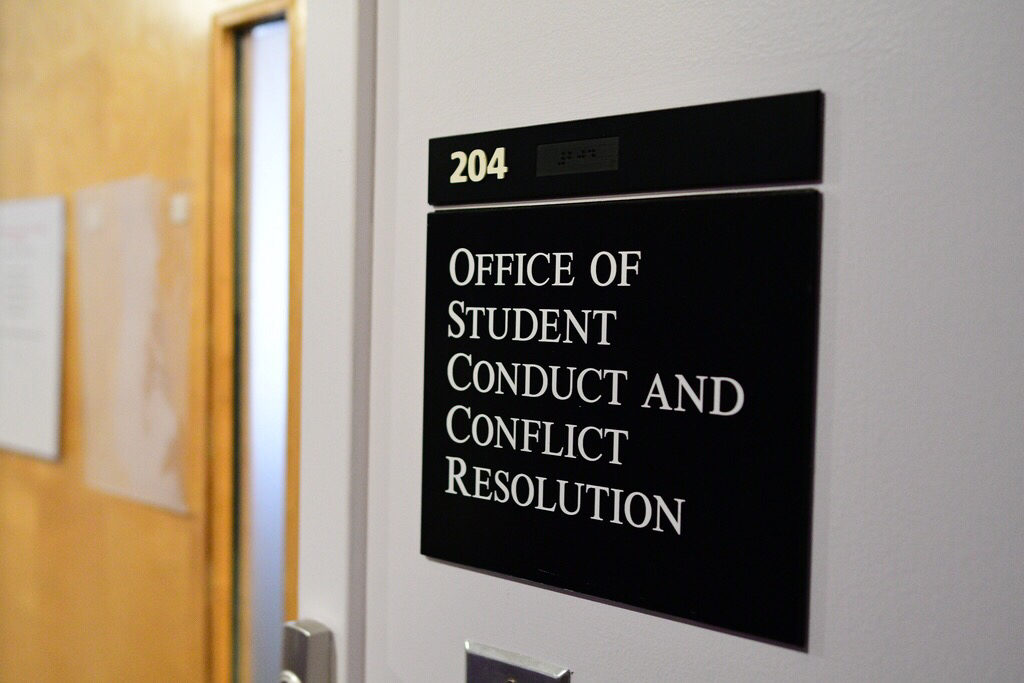Students, former RAs unsure of OSCCR fines’ effectiveness
The outside of the Office of Student Conduct and Conflict Resolution in Ell Hall.
October 2, 2019
“ResLife, open up!”
These words have led many Northeastern students to Northeastern’s Office of Student Conduct and Conflict Resolution, or OSCCR. OSCCR is NU’s primary disciplinary office for drug and alcohol offenses.
If they are below the legal drinking age, students can expect to be sanctioned by OSCCR if caught consuming or being clearly under the influence of alcohol. OSCCR can also discipline underage students for being in the presence of someone consuming alcohol or for possessing an empty alcohol container, unless they live with students who are aged 21 or above.
These sanctions typically consist of a “formal warning” from the university such as academic probation or deferred suspension, a mandatory drug/alcohol education class or counseling session and a monetary fine of either $100 or $200 depending on the severity of the offense and if the student in question has already been sanctioned in the past.
“When we got the list of sanctions from OSCCR, it blew us away,” said Cameron Mackechnie, a third-year computer science major. During their freshman year, Mackechnie and his roommates were placed on deferred suspension and received fines of $200 each after a resident assistant, or RA, found an empty beer bottle and a glass with half a shot of liquor in his four-person dorm room.
A third-year business administration major, who chose to remain anonymous for professional reasons, said he experienced something similar.
“Because the person whose dorm we were in had already been written up by OSCCR, and he didn’t want to get in trouble again, I said the beer was mine. I got written up by OSCCR and fined $100 for a single beer,” he said. “I think it was unnecessary.”
The student said he questions the effectiveness of fines as a deterrent and suggested that the university has ulterior motives. “In some sense, it is a way to scare people from doing it. But it’s also just milking money out of us.”
Mackechnie also said that his fine frustrated him.
“I [was] a freshman in college. The money that I [was] surviving off of was the money I got from graduation from a few family members and the minimum wage job that I had been working all summer where I made $200 a week if I was lucky,” Mackechnie said. “That basically was like two and a half weeks of what I was trying to spend. I had to scrounge during that period. As a freshman in college who already is developing their time management skills, that sucks.”
Alex Velto, a recent graduate who once worked as a senior RA, said he believes OSCCR fines are discriminatory against lower-income students. “The problem that I have with financial based systems is that they heavily penalize people who aren’t well off, and people who are well off can do whatever they want and just pay the fine.”
Michael Mendez, a former RA in Smith Hall, said for some students, $100 can be very burdensome. “If I was a freshman, I would not have been able to afford a $100 fine without help.”
He said drinking was never out of control with his “extremely studious” residents anyway.
Velto said he doubts that fines are an effective deterrent against underage drinking. “I’m sure [OSCCR] believe[s] it’s a deterrent … If they can pay the fine, they will kind of just shrug that off.”
He pointed to formal warnings as more effective deterrents. “Probation is enough. Probation scares people. That, I watched change behavior more often than the fine,” he said.
Students who have been sanctioned by OSCCR said that formal warnings like disciplinary probation and deferred suspension were more effective than monetary fines.
“It bummed me out that even in a situation where it could have been an honest mistake … I still had to get put on deferred suspension, which freaked me out,” said a fifth-year industrial engineering student who was caught drinking while underage and distributing alcohol to a minor. He has chosen to remain anonymous for fear of damaging future job prospects.
“I was so nervous at parties after that. Whenever there were underage kids around that were drinking, I would always evaluate what was going on,” the student said.
Velto said he doesn’t see underage drinking ever stopping at Northeastern. “The problem is I can’t really come up with a system that would deter drinking … College students are going to drink.”
According to the 2017 National Survey on Drug Use and Health, 53.6 percent of full-time college students ages 18 to 22 drank alcohol in the past month.
A fourth-year computer science and business administration major whom an RA found to be under the influence of alcohol and who wished to remain anonymous for fear of damaging future job prospects said Northeastern should take a less adversarial approach to reducing underage drinking.
“The way Northeastern does it is like, ‘Don’t do it, even though I know you’re going to.’ If I was on campus in my dorm, that is a much safer place than me walking 25 minutes to Roxbury Crossing, an area I don’t know, and then drinking and then having to figure out how to get back home,” the student said.
Earlier this year, Wentworth Institute of Technology sophomore Max Carbone was found dead after leaving a party on Mission Hill.
“I think there can be a lot done within the communities in the dorms as opposed to taking it to the campus level. I feel like working with RDs and RAs internally in the dorms as opposed to involving OSCCR could be effective,” Mackechnie said. “I feel like that could definitely be a better route rather than sending it to OSCCR and everyone freaking out because of this acronym.”







